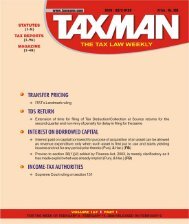news round up - Taxmann
news round up - Taxmann
news round up - Taxmann
- TAGS
- news
- round
- taxmann
- taxmann.com
Create successful ePaper yourself
Turn your PDF publications into a flip-book with our unique Google optimized e-Paper software.
122 GOODS & SERVICES TAX - MAGAZINE [Vol. 1<br />
CONSTITUTIONAL AMENDMENT - A<br />
PREREQUISITE FOR GST<br />
The Empowered Committee of State Finance<br />
Ministers on November 10, 2009 unveiled<br />
the contours of the proposed GST in its<br />
‘First Discussion Paper on Goods and Services<br />
Tax in India’. The launch of the new system<br />
requires preparation and constitutional amendment<br />
is one of the few important and emergent<br />
needs for smooth rollout. It is considered necessary<br />
because with GST in place, there would be<br />
unified tax-‘tax on goods and services’ and the<br />
discrete jurisdiction of the Centre and States to<br />
levy tax would ipso facto merge, which the Constitution<br />
does not provide for. As the Constitution<br />
does not vest express power either in the Central<br />
Government or State Governments to levy tax on<br />
the ‘s<strong>up</strong>ply of goods and services’ and also does<br />
not empower the States to impose tax on imports,<br />
it becomes essential to have constitutional<br />
amendments for empowering the Centre to<br />
levy tax on sale of goods and States for levy of<br />
service tax and tax on imports and other consequential<br />
issues.<br />
CA. GEETA DAS<br />
Our Constitution and Levy<br />
1. India has a three-tier federal structure comprising of the Union Government,<br />
the State Governments and the Urban/Rural Local Bodies. The<br />
Constitution of India elaborately lays down the framework, defines the<br />
fundamental rights, directive principles, the structure, powers and duties<br />
of the Government including the power to levy taxes distributed among<br />
the three tiers of the Governments of the Constitution, article 246 of the<br />
Constitution of India enlists three different lists, namely, the List I (Union<br />
List), List II (State List) and List III (the Concurrent List). In accordance<br />
with the provisions of the article, the Parliament enjoys the exclusive<br />
powers to make laws with respect to any of the matters enumerated in the<br />
Union List; the Legislature of any State has the exclusive power to make<br />
law for the respective State or any part thereof with respect to the matters<br />
enumerated in the State List. And insofar as the Concurrent List is<br />
concerned, the Parliament and the State Legislatures both have the power<br />
to make laws with respect to any of the matters enumerated in List III.<br />
GOODS & SERVICES TAX CASES ❑ JANUARY 20 - FEBRUARY 4, 2010 ◆ 32











![“FORM NO. 3CEB [See rule 10E] Report from an ... - Taxmann](https://img.yumpu.com/45480232/1/190x245/form-no-3ceb-see-rule-10e-report-from-an-taxmann.jpg?quality=85)





